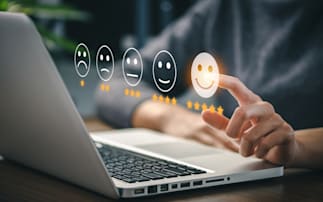Every weekend when I bike along a portion of the local trail, I get stopped and asked to show my trail pass. At first this was a source of frustration as I am somewhat obsessed with tracking my average speed and this slows me down. After a couple of times, I asked the guy if he remembered me from the previous week and we struck up a bit of a conversation. Before we parted, I asked him his name and he had mine from looking at my trail pass. The next weekend as I approached him, instead of getting frustrated, I called out, "Hey Ken, it’s Corey," and he waved me by as he said hello. We had built a relationship.
While this is an example of an informal relationship, there are much more significant benefits to developing strong relationships with people that you interact with in the more formal work world. The most obvious example is with clients. With good client relationships, comes loyalty and better profitability for any business. These relationships and loyalty can then lead to new client referrals and the ability to cross-sell additional products or services. It also provides the ability to be competitive on price while not necessarily having to be the lowest cost provider. If clients value the relationship, they don’t focus strictly on the cheapest price.
Another overlooked benefit of strong relationships is getting the benefit of the doubt from the client if something goes awry. An example of this happened recently where a client was very upset about a situation that occurred. The client escalated things and wanted to meet with me to talk about what happened. At first the client was upset and was even talking about changing banks. But after talking through the situation and being able to vent her frustrations to me, she left satisfied and content with leaving her accounts with us. We even ended on a very positive note, exchanging stories about our kids and catching up about our families. That’s the value of having had a long-term relationship with this client. Without it, she would have simply left and not given me the opportunity to sit down and talk with her, which ultimately gave us the chance to save the relationship.
The client side may be obvious, but there’s also value to investing in vendor/supplier relationships. Even though you are the client in that situation, working to develop a positive relationship with this business partner, can pay dividends. For example, when you’re in a pickle and really need something from a supplier like unusually quick turnaround, if you have a positive relationship they’re more likely willing to go the extra mile for you. This applies to internal client relationships as well. As many of you likely also do, we work hard to make sure our internal support teams understand that they serve internal clients. But it’s also important for those internal clients to work at developing positive relationships with their internal suppliers, who can be taken for granted, and have a very high likelihood of impacting the external client’s satisfaction level.
Whether you are the supplier or client, whether it’s external or internal, and whether it’s formal or a causal drive by, these relationships you build impact you personally and professionally. Now each time I see my new friend Ken on the trail it’s not a source of frustration but a pleasant exchange, and when he’s not there I actually miss seeing him. When I went biking this last weekend, I actually voluntarily stopped so I could tell Ken how our relationship was the inspiration for this blog, make sure he was okay with me mentioning him, and give him the info so he could check it out. As I rode away, I hollered "I’ll see you next week Ken!" Isn’t life just better when we have positive relationships with people?





